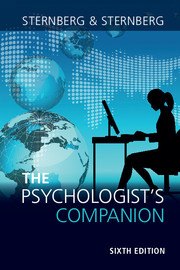 The Psychologist's Companion
The Psychologist's Companion Book contents
- Frontmatter
- Contents
- Preface
- Acknowledgments
- Introduction
- Part I Macro-Challenges in Writing Papers: Planning and Formulating Papers
- 1 Eight Common Misconceptions about Psychology Papers
- 2 How to Generate, Evaluate, and Sell Your Ideas for Research and Papers
- 3 Literature Research
- 4 Writing a Literature Review
- 5 Planning and Writing the Experimental Research Paper
- 6 Ethics in Research and Writing
- Part II Micro-Challenges in Writing Papers: Presenting Your Ideas in Writing
- Part III Writing and Preparing Articles for Journal Submission
- Part IV Presenting Yourself to Others
- Epilogue
- References
- Index
3 - Literature Research
from Part I - Macro-Challenges in Writing Papers: Planning and Formulating Papers
Published online by Cambridge University Press: 24 November 2016
- Frontmatter
- Contents
- Preface
- Acknowledgments
- Introduction
- Part I Macro-Challenges in Writing Papers: Planning and Formulating Papers
- 1 Eight Common Misconceptions about Psychology Papers
- 2 How to Generate, Evaluate, and Sell Your Ideas for Research and Papers
- 3 Literature Research
- 4 Writing a Literature Review
- 5 Planning and Writing the Experimental Research Paper
- 6 Ethics in Research and Writing
- Part II Micro-Challenges in Writing Papers: Presenting Your Ideas in Writing
- Part III Writing and Preparing Articles for Journal Submission
- Part IV Presenting Yourself to Others
- Epilogue
- References
- Index
Summary
Whether you are writing a literature review or working on an experimental research paper, literature research is an important factor. Nowadays, you can get the information you need in several ways. First, you can consult journals and books that you can find in libraries and archives. Second, you can conveniently use the Internet from your own home or workplace to retrieve an enormous amount of information.
In this chapter, we first describe different kinds of reference materials. We also provide a list of reference materials that may be useful for your research. We then give you an introduction to literature research and some of the databases that you are likely to use. Afterward, a section on Internet research gives you an overview of search engines, how best to search for keywords, types of information available on the Internet, and how to evaluate the information you find online. Last, we elaborate on the function of bibliographical software and its use for your research.
REFERENCE MATERIALS
Authors of psychology papers should be aware of the references available to them. There are many different kinds of resources you can consult. Here are some of them:
■ Almanacs
Almanacs are annual publications that contain information and statistics on a wide array of topics. The World Factbook is an almanac, for example. There are almanacs for many specialized fields, for example, for special education. The entries are sorted according to general headings, so you may have to think about superordinate topics that belong to your interest to find the information you need.
■ Bibliographies
Bibliographies list the works of a certain writer or focus on certain topics. If you are interested in a particular topic, like the concept of time in psychology, for example, a bibliography can help you find literature on this topic.
■ Dictionaries
Dictionaries show the correct spellings of words and may list synonyms or alternative words to look up. Similar to encyclopedias, they often also contain short entries that explain the word. There are general dictionaries and dictionaries that specialize in one subject area, for example, psychology. There are also specialized dictionaries, such as of synonyms and antonyms.
- Type
- Chapter
- Information
- The Psychologist's CompanionA Guide to Professional Success for Students, Teachers, and Researchers, pp. 49 - 64Publisher: Cambridge University PressPrint publication year: 2016


